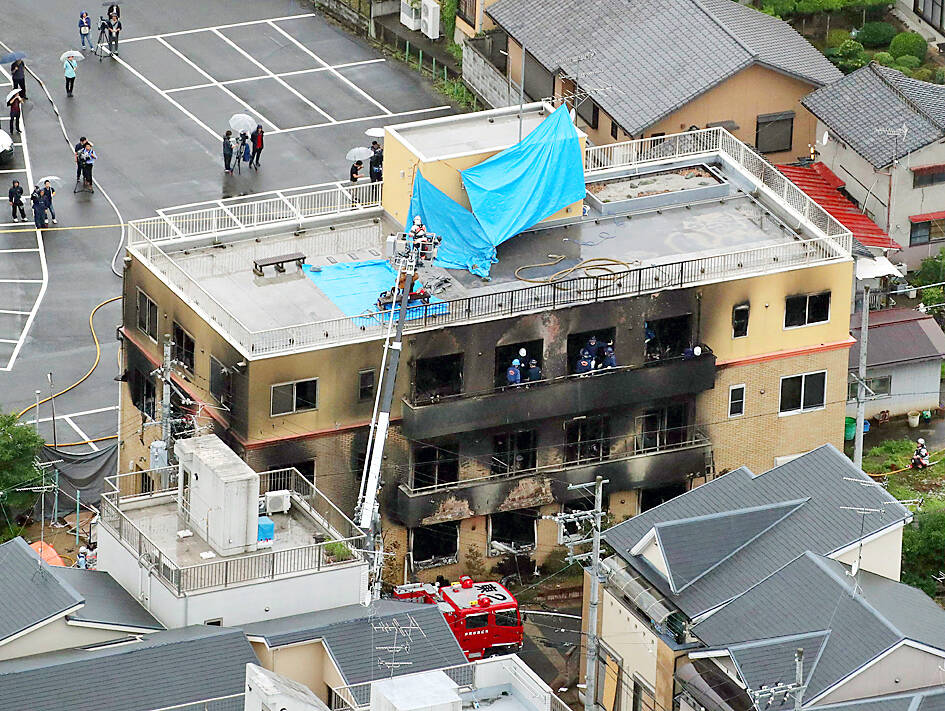A Japanese court yesterday sentenced a man to death after finding him guilty of murder and other crimes for carrying out an arson attack on an anime studio in Kyoto, Japan, that killed 36 people.
The Kyoto District Court said it found the defendant, Shinji Aoba, mentally capable of facing punishment for the crimes and announced his sentence after a recess.
Aoba stormed into Kyoto Animation’s No. 1 studio on July 18, 2019, and set it on fire in an attack that shocked Japan and drew an outpouring of grief from anime fans worldwide.

Photo: EPA-EFE
More than 30 other people were badly burned or injured.
Prosecutors said he was seeking revenge after thinking the company had stolen novels he submitted for a contest.
Aoba, 45, was severely burned and was hospitalized for 10 months before his arrest in May 2020. He appeared in court in a wheelchair.
Aoba’s defense lawyers said he was mentally unfit to be held criminally responsible.
About 70 people were working inside the studio in southern Kyoto, Japan’s ancient capital, at the time of the attack. One of the survivors said he saw a black cloud rising from downstairs, then scorching heat came and he jumped from a window of the three-story building gasping for air.
The company, founded in 1981 and better known as KyoAni, made a mega-hit anime series about high-school girls, and the studio trained aspirants to the craft.
Japanese media have described Aoba as being thought of as a troublemaker who repeatedly changed contract jobs and apartments, and quarreled with neighbors.
The fire was Japan’s deadliest since 2001, when a blaze in Tokyo’s congested Kabukicho entertainment district killed 44 people. It was also the country’s worst known case of arson in modern times.

The US government has signed defense cooperation agreements with Japan and the Philippines to boost the deterrence capabilities of countries in the first island chain, a report by the National Security Bureau (NSB) showed. The main countries on the first island chain include the two nations and Taiwan. The bureau is to present the report at a meeting of the legislature’s Foreign Affairs and National Defense Committee tomorrow. The US military has deployed Typhon missile systems to Japan’s Yamaguchi Prefecture and Zambales province in the Philippines during their joint military exercises. It has also installed NMESIS anti-ship systems in Japan’s Okinawa

‘WIN-WIN’: The Philippines, and central and eastern European countries are important potential drone cooperation partners, Minister of Foreign Affairs Lin Chia-lung said Minister of Foreign Affairs Lin Chia-lung (林佳龍) in an interview published yesterday confirmed that there are joint ventures between Taiwan and Poland in the drone industry. Lin made the remark in an exclusive interview with the Chinese-language Liberty Times (the Taipei Times’ sister paper). The government-backed Taiwan Excellence Drone International Business Opportunities Alliance and the Polish Chamber of Unmanned Systems on Wednesday last week signed a memorandum of understanding in Poland to develop a “non-China” supply chain for drones and work together on key technologies. Asked if Taiwan prioritized Poland among central and eastern European countries in drone collaboration, Lin

Renewed border fighting between Thailand and Cambodia showed no signs of abating yesterday, leaving hundreds of thousands of displaced people in both countries living in strained conditions as more flooded into temporary shelters. Reporters on the Thai side of the border heard sounds of outgoing, indirect fire yesterday. About 400,000 people have been evacuated from affected areas in Thailand and about 700 schools closed while fighting was ongoing in four border provinces, said Thai Rear Admiral Surasant Kongsiri, a spokesman for the military. Cambodia evacuated more than 127,000 villagers and closed hundreds of schools, the Thai Ministry of Defense said. Thailand’s military announced that

CABINET APPROVAL: People seeking assisted reproduction must be assessed to determine whether they would be adequate parents, the planned changes say Proposed amendments to the Assisted Reproduction Act (人工生殖法) advanced yesterday by the Executive Yuan would grant married lesbian couples and single women access to legal assisted reproductive services. The proposed revisions are “based on the fundamental principle of respecting women’s reproductive autonomy,” Cabinet spokesperson Michelle Lee (李慧芝) quoted Vice Premier Cheng Li-chiun (鄭麗君), who presided over a Cabinet meeting earlier yesterday, as saying at the briefing. The draft amendment would be submitted to the legislature for review. The Ministry of Health and Welfare, which proposed the amendments, said that experts on children’s rights, gender equality, law and medicine attended cross-disciplinary meetings, adding that